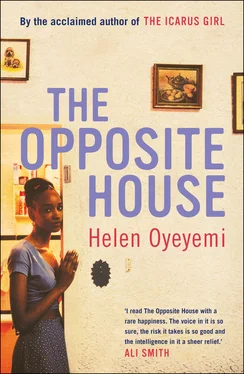Helen Oyeyemi - The Opposite House
Здесь есть возможность читать онлайн «Helen Oyeyemi - The Opposite House» весь текст электронной книги совершенно бесплатно (целиком полную версию без сокращений). В некоторых случаях можно слушать аудио, скачать через торрент в формате fb2 и присутствует краткое содержание. Год выпуска: 2008, Издательство: Bloomsbury UK, Жанр: Современная проза, на английском языке. Описание произведения, (предисловие) а так же отзывы посетителей доступны на портале библиотеки ЛибКат.
- Название:The Opposite House
- Автор:
- Издательство:Bloomsbury UK
- Жанр:
- Год:2008
- ISBN:нет данных
- Рейтинг книги:4 / 5. Голосов: 1
-
Избранное:Добавить в избранное
- Отзывы:
-
Ваша оценка:
- 80
- 1
- 2
- 3
- 4
- 5
The Opposite House: краткое содержание, описание и аннотация
Предлагаем к чтению аннотацию, описание, краткое содержание или предисловие (зависит от того, что написал сам автор книги «The Opposite House»). Если вы не нашли необходимую информацию о книге — напишите в комментариях, мы постараемся отыскать её.
The Opposite House — читать онлайн бесплатно полную книгу (весь текст) целиком
Ниже представлен текст книги, разбитый по страницам. Система сохранения места последней прочитанной страницы, позволяет с удобством читать онлайн бесплатно книгу «The Opposite House», без необходимости каждый раз заново искать на чём Вы остановились. Поставьте закладку, и сможете в любой момент перейти на страницу, на которой закончили чтение.
Интервал:
Закладка:
‘OK,’ I say, pretending to leaf through Time Out , knowing that he’ll fall asleep before he even finds his shoes.
On the sofa he begins to drowse with his head on my lap, mumbling, ‘Sorry I’m so crap,’ into the fabric of my jeans. I draw my fingers through his hair and tell him to shut up. He sleeps with his grey eyes half open and intent on some object at floor level.
Aaron knows Amy Eleni from a church choir they both used to sing in before Amy Eleni dropped out. I think they must have recognised something in each other, some poorly concealed intensity that other people find nerve-wracking. The first time I met him, when he joined me on a tinsel-strewn sofa at Amy Eleni’s birthday party, Aaron drifted into sleep the way he is drifting now. Then it was because he trusted the swell of skin-longing that drew us together in a searching curve, had us asking each other with our eyes and our small, ironic smiles, Can I touch you? His head sought my lap as if he had every right to claim me for his pillow. And I, I drew my knees up a little higher, feeling his soft hair slipping as he moved with me, feeling his eyes on my lips, drinking in his face; in that way we kissed before we kissed.
Aaron has a strange accent, unevenly crammed with tonality. Some words he sings, others he says so flatly that they’re lost. I thought at first that he might be one of the more outlandish white South Africans until he told me that he had been born and raised in Ghana. When I remember, my accent is as firm and clean as I can make it; it bears unabbreviated sentences with all their rich vowels gutted out by a sharp tip of mindfulness. I speak like this because my parents — their voices smoothed to calm, placeless melody through academia — speak English like this. And I speak like this because it is important that I’m understood. In a country where ears are attuned to courteous, clipped white noise, being asked to repeat myself batters down the words in me, makes my tongue fall down my throat.
At the party, Aaron seemed to be listening to more than just my words; when he dropped his gaze I heard our breathing — his breath absorbed mine and took wings and fluttered shallow, weak, confused at its suddenly expanded span. I was so obviously talking about nothing that I stopped to ask him a question, and it was only when he answered thickly and after a long pause that I realised he had been snoring lightly.
His mouth is maddeningly soft and full; I draw my thumb lightly over his lips and he nips at me.
I hear feet dragging on the steps outside, and the sound has my heartbeat jumping in the palm of my hand, even though I know it’s only Miss Lassiter. It’s only Miss Lassiter, and her envelope is due today. But it holds me still when she takes so long to put the envelope down, waits so long silent outside the door before she shuffles away (it’s just that she’s old, it’s just that she’s old, she can’t move so quickly)
I have to wait. I have to wait until I feel that Miss Lassiter has gone. It takes a long time to feel that Miss Lassiter has gone. She is only really gone when Mami calls.
Mami is in the payphone down the road from her and Papi’s house.
‘I’m never going back in there again,’ Chabella whispers. I imagine her in the phone box, her fingers holding on to the receiver around one of the disposable handkerchiefs that she reserves for public toilets and public telephones. I close the sitting-room door and sandwich the phone between my ear and my shoulder as I pull my coat on. That pang around my throat comes back, it comes like a guillotine.
‘Do you want to stay here?’ I ask, automatically. ‘Shall I come and get you? What happened?’
Mami’s sob — one sound, arrested because it is so rageful. The words that follow can only tread softly over that sound.
‘He’s broken it.’
‘What?’
‘My altar.’
Mami is a Santero. She constantly tells me that I don’t know what that means. I soon outgrew Mami’s evening flower ceremonies. After a while, the flowers that seemed to answer Chabella’s questions in raptures of hush and smoke revealed themselves to be limp rice paper. What is it that’s holy about those flowers? Is it that they burn? Or that they burn so readily? But you can burn a cross, a witch, a piece of toast. .
Chabella’s Papi was not a believer in anything much, and believers in Habana were suspicious that Chabella wanted to be one of them. They did not know her or her father, and they had to be careful, so Mami had to make her own Santeria. When I think of her Santeria initiation I see her surrounded by her Orishas — her guardian Yoruba gods. I see my Mami kneeling with her eyes turned ecstatically upwards into the wet curtains of her eyelids as her priest cuts two bars, each one as thick as a slug’s trail, into the flesh of her tongue. Her altar is a series of four interlinked shrines, grooved pentagons of painted wood and brass threaded with flowers and rosaries and shells and stones and candles and saucers, all of fidelity’s sparse jewellery.
The Orishas came into Cuba on the ships of 1500, which were built as temporary coffers for black gold. The Yoruba gods discovered their Cuba in the dark, hidden in bigger emergencies and cries of warning as patrol ships tried to intercept the cargo. The gods were hidden in the fear of being drowned. They were hidden in the unseen smack, smack, smack of the next man’s head on the ship’s boards as he tried to damage his brain and decrease his market value. The gods were not afraid, but they wept.
On arrival, the Orishas became beloved in secret. Slaves had to be Catholic and obedient or they’d be killed, or worse. The Word ‘slave’ is a big deal to Chabella and Papi; neither of them can get out from under it. It is blackness in Cuba. It is sometimes bittersweet, for such is the song of the morena; it is two fingers placed on a wrist when a white Cuban is trying to describe you. Papi tries to systematise it and talk about the destruction of identity and the fragility of personality, but he is scared of the Word. Mami hides inside the Word, finds reveries in it, tries to locate a power that she is owed.
The slaves in Cuba learnt to recognise their gods when they saw ripped white bed sheets, forked scraps of wood, overturned tin buckets. These things marked places where mass could be celebrated. If you still knew who you were, you had to keep it a secret. The gods hid among the saints and apostles and nobody perceived them unless they wanted to; it didn’t take as much as people had thought for Catholicism and Yoruba to fuse together. The saints intercede for us with God, who must despise us to let us suffer so. The Orishas intercede for us with Olorun who, being a darker side of God, possibly despises us more. A painting of a saint welling holy tears and the story of an Orisha teach you the same thing — if you cry for someone, it counts as a prayer.
2 mama proserpine and her aspects
In the Cuba house, before before, Aya and her Mama loved so fiercely. For noonday naps they lay entangled in the centre of the bed, fingers tearing tracks in each other’s hair. When awake, Aya followed where her Mama went, shoes clacking on bamboo tiles. Perched on an outcrop of their greeny-gold garden, Aya and her Mama were so close together that they heard the water slewing down the rocks with the same ear. And Aya’s Mama warned: Beware Proserpine, since she is the murder that walked from my heart.
Before Aya was born, Proserpine came and caught Aya’s Mama unawares. Proserpine came when Aya’s Mama was still carrying baby Aya in her stomach, ripe, ripe, and feeling it. Every step Mama took she felt in her stomach, through Aya. Steps became sharp teeth — they bit. They tried to pull baby and mother asunder. Temper was the only way to be higher. One day, because she had raised her voice against him
Читать дальшеИнтервал:
Закладка:
Похожие книги на «The Opposite House»
Представляем Вашему вниманию похожие книги на «The Opposite House» списком для выбора. Мы отобрали схожую по названию и смыслу литературу в надежде предоставить читателям больше вариантов отыскать новые, интересные, ещё непрочитанные произведения.
Обсуждение, отзывы о книге «The Opposite House» и просто собственные мнения читателей. Оставьте ваши комментарии, напишите, что Вы думаете о произведении, его смысле или главных героях. Укажите что конкретно понравилось, а что нет, и почему Вы так считаете.












